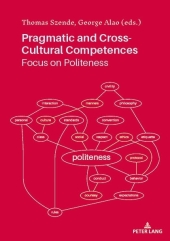 Neuerscheinungen 2019Stand: 2020-02-01 |
Schnellsuche
ISBN/Stichwort/Autor
|
Herderstraße 10
10625 Berlin
Tel.: 030 315 714 16
Fax 030 315 714 14
info@buchspektrum.de |

George Alao, Thomas Szende
(Beteiligte)
Pragmatic and Cross-Cultural Competences
Focus on Politeness
Herausgegeben von Szende, Thomas; Alao, George
Neuausg. 2019. 290 S. 42 Abb. 229 mm
Verlag/Jahr: PETER LANG LTD. INTERNATIONAL ACADEMIC PUBLISHERS 2019
ISBN: 2-8076-0747-0 (2807607470)
Neue ISBN: 978-2-8076-0747-7 (9782807607477)
Preis und Lieferzeit: Bitte klicken
This volume contains contributions that, based on authentic data from diverse African, Asian and European languages, literatures and cultures, shed a new light on politeness as a central phenomenon in pragmatics, and on what is at stake when teaching or learning the subject.
The L2 speaker is able to function in the target culture only when s/he is able to understand, anticipate and produce the choices that the said society makes. Being polite therefore means: knowing how to draw on the conventions of a society, taking into account the expectations ofan interlocutor regarding social relations at any given point, and is based on the appropriate language registerto the communication situation; being able to balance standard and non-standard features and to adjust one´s speech by moving it towards more or less familiarity, or formality. The learner therefore needs to be aware of the pragmatic flexibility of speakers - native and experts - who move from one register to another and juggle between respect and caution, first degree meaning and irony, exuberance and excess, with difference in levels, nature and degrees of politeness.
This volume contains contributions whose theoretical reflections, field work experiences and authentic data from diverse African, Asian and European languages, literatures and cultures as well as a variety of corpora shed new light on politeness as a central phenomenon in pragmatics, and on what is at stake when teaching or learning the subject. It also opens up a conceptual dialogue with a whole range of domains likely to enrich the debate: sociolinguistics, literature, translation studies, semiotics, cultural anthropology, social psychology, etc.
Contents: Thomas SZENDE & George ALAO: Introduction - Anthony J. LIDDICOAT & Troy McCONACHY: Meta-pragmatic awareness and agency in language learners´ constructions of politeness - Peter STOCKINGER: The topos of polite behavior. Exploring thematic, narrative and discursive structures of a lexical field - Istvan KECSKES: Impoliteness as a part of pragmatic competence in L2 - Hélène DE PENANROS: When politeness is in the detail: the case of an imperative in Russian - Junji GONG & Jo‰l BELLASSEN: Teaching fictive kinship terms in Chinese as a Foreign Language - San San HNIN TUN: Expressing politeness with discourse particles in Myanmar language - Festus A. SOYOYE: Politeness and terms of address and reference in French and YoruÞbaì - Jin-Ok KIM: Expression of politeness in Korean as a Foreign Language: diversity of linguistic means and order of acquisition - Viet Anh NGUYEN: Modelling a new approach to researching and teaching politeness in Vietnamese as an L2 - Orsolya MARàTI: Politeness and pragmatic competence in teaching Hungarian as a Second Language: successes and pitfalls - Marijana PETROVIC: Should impoliteness be taught? - Shima MOALLEMI: L2 socialization, construction of bilingual pragmatic competence and the Persian politeness system "ta´ârof" - Festus A. SOYOYE, Tajudeen A. OSUNNIRAN & Joy C. NNABUIFE: A contrastive analysis of politeness strategies in West African Francophone and Igbo commercial interactions - Christelle HOPPE: Critical thinking, cognitive presence and social languages in an LMOOC - Elise Solange BAGAMBOULA: Politeness or buzitú ("respect") in Kikoongo (Laari)


